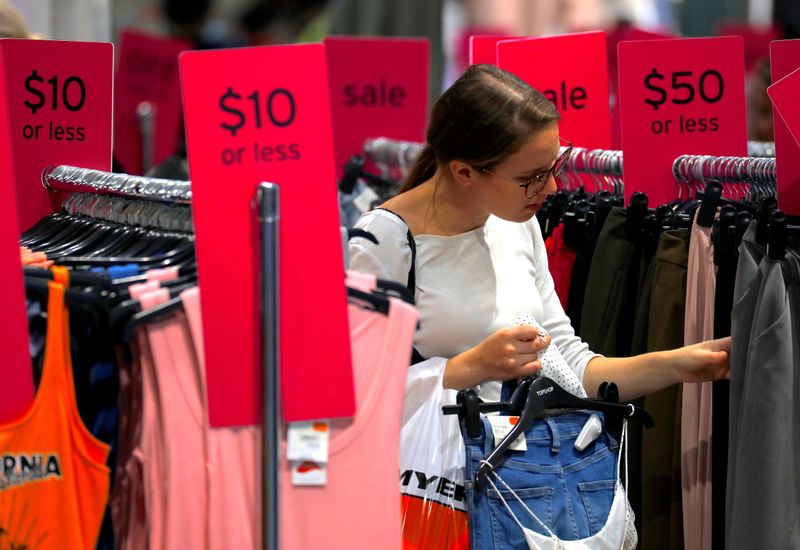By Swati Pandey
SYDNEY (Reuters) - Australian retail sales slumped in June as coronavirus lockdowns and mobility restrictions in much of the country hit demand, casting a shadow over the outlook for growth in the third quarter as COVID-19 cases continue to rise.
Retail turnover in June fell 1.8% from a month earlier, the biggest drop this year, preliminary figures from the Australian Bureau of Statistics (ABS) showed on Wednesday. That compared with a larger-than-expected 0.4% gain in May and a median forecast for a 0.5% drop.
"We expect retail sales to fall again in July as the Sydney lockdown intensifies, another Melbourne lockdown starts and South Australia also falls into lockdown," ANZ economists wrote in a note.
"As the risks of a long Sydney lockdown increase, so do the risks of a muted recovery."
Electronics giant JB Hi-Fi this week warned its sales have suffered through July while a ban on construction activity in Sydney will likely hit hardware store sales.
Reduced government income support and job insecurities amid extended lockdowns could further hit demand, economists warned.
Prime Minister Scott Morrison on Wednesday assured Australians that the government was providing "timely, proportionate and targeted" support, adding the lockdowns would have a "significant" impact on economic growth in the current quarter.
The remarks come as the virus situation worsened on Wednesday with both Victoria state and Sydney reporting sharp increases in new COVID-19 cases.
"With around half of Australia's population and economy now subject to hard lockdowns, the country's 'V'-shaped economic recovery could quickly become 'W'-shaped if persistent COVID-19 outbreaks aren't brought under control," CommSec economist Ryan Felsman said.
Fears that current lockdowns across three of Australia's six states would extend sent the local dollar in a tailspin as it slipped for a fifth straight session to the lowest since November 2020. [AUD/]
Already, a majority of economists are predicting Australia's A$2 trillion ($1.5 trillion) economy will shrink in the third quarter, its first contraction since June 2020, while the country's central bank is seen reversing its taper decision in response to the current virus outbreak.
The slowdown in demand is already evidenced by weekly consumer confidence readings, with the latest report showing a 5.2% slump last week, the biggest fall since March 2020 when the pandemic first hit.

Credit and debit card spending data from the Commonwealth Bank showed a 0.6% drop in New South Wales, of which Sydney is the capital city, over the week ending July 16 versus 2019 levels. That compares with a 2.1% lift in the prior week.
($1 = 1.3682 Australian dollars)